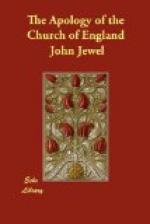How say ye, do we devise these tales? Is not this the course of the councils in these days? Are not all things removed from the whole holy council, and brought before the Pope alone? that, as though nothing had been done to purpose by the judgments and consents of such a number, he alone may add, alter, diminish, disannul, allow, remit, and qualify whatsoever he list? Whose words be these, then? and why have the bishops and abbots, in the last council of Trident, but of late concluded with saying thus in the end: “Saving always the authority of the see apostolic in all things?” or why doth Pope Paschal write so proudly of himself? “As though,” saith he, “there were any general council able to prescribe a law to the Church of Rome: whereas all councils both have been made and have received their force and strength by the Church of Rome’s authority; and in ordinances made by councils, is ever plainly excepted the authority of the Bishop of Rome.” If they will have these things allowed for good, why be councils called? But if they command them to be void, why are they left in their books as things allowable?
But be it so: let the Bishop of Rome alone be above all councils, that is to say, let some one part be greater than the whole; let him be of greater power, let him be of more wisdom than all his; and, in spite of Hierom’s head, let the authority “of one city be greater than the authority of the whole world.” How, then, if the Pope have seen none of these things, and have never read either the Scriptures, or the old Fathers, or yet his own councils? How if he favour the Arians, as once Pope Liberius did? or have a wicked and a detestable opinion of the life to come, and of the immortality of the soul, as Pope John had but few years since? or, to increase his own dignity, do corrupt other councils, as Pope Zosimus corrupted the council holden at Nice in times past; and do say that those things were devised and appointed by the holy Fathers which never once came into their thought; and, to have the full sway of authority, do wrest the Scriptures, which, as Camotensis saith, is an usual custom with the Popes? How if he have renounced the faith of Christ, and become an apostate, as Lyranus saith many Popes have been? And, yet for all this, shall the Holy Ghost, with turning of a hand, knock at his breast, and even whether he will or no, yea, and wholly against his will, kindle him a light so as he may not err? Shall he straightway be the head-spring of all right; and shall all treasure of wisdom and understanding be found in him, as it were laid up in store? or, if these things be not in him, can he give a right and apt judgment of so weighty matters? or, if he be not able to judge, would he have that all those matters should be brought before him alone?




